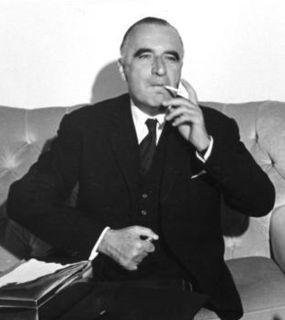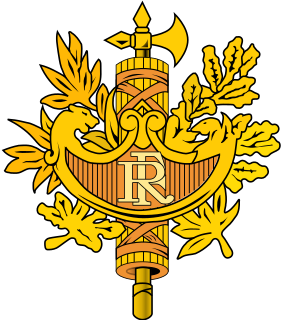Background
In the Third and Fourth Republic, Parliament elected the President of the Republic. In the original 1958 constitution of the Fifth Republic, the president was elected by an electoral college, in a manner similar to the senators: electors were the members of Parliament, members of the departmental assemblies, and representatives of cities, towns and villages (such as mayors). [3] Charles de Gaulle was elected in this manner in the 1958 presidential election.

The French Third Republic was the system of government adopted in France from 1870, when the Second French Empire collapsed during the Franco-Prussian War, until 10 July 1940 after France's defeat by Nazi Germany in World War II led to the formation of the Vichy government in France.

The Fifth Republic, France's current republican system of government, was established by Charles de Gaulle under the Constitution of the Fifth Republic on 4 October 1958. The Fifth Republic emerged from the collapse of the Fourth Republic, replacing the former parliamentary republic with a semi-presidential, or dual-executive, system that split powers between a Prime Minister as head of government and a President as head of state. De Gaulle, who was the first French President elected under the Fifth Republic in December 1958, believed in a strong head of state, which he described as embodying l'esprit de la nation.
In the administrative divisions of France, the department is one of the three levels of government below the national level, between the administrative regions and the commune. Ninety-six departments are in metropolitan France, and five are overseas departments, which are also classified as regions. Departments are further subdivided into 334 arrondissements, themselves divided into cantons; the last two have no autonomy, and are used for the organisation of police, fire departments, and sometimes, elections.
The presidential office in the Third and Fourth republic was largely ceremonial, with most executive power vested in the "president of the Council of ministers" (short: "president of the Council" or président du conseil), a more powerful analogue to the present-day Prime minister. Charles de Gaulle, who largely designed the constitution of the Fifth Republic, wanted a more powerful presidential office. The proposed change would have the president elected by the two-round system of voting; This direct election by more than half of the non-blank ballots directly cast by the citizenship would give the office much more legitimacy and status than indirect election by the presidential college, thus greater influence even with unchanged constitutional powers.

The two-round system is a voting method used to elect a single winner, where the voter casts a single vote for their chosen candidate. However, if no candidate receives the required number of votes, then those candidates having less than a certain proportion of the votes, or all but the two candidates receiving the most votes, are eliminated, and a second round of voting is held.
Proposal and debate
- See French legislative election, 1962 for more about the French politics of that time.
Charles de Gaulle soon preferred to be elected by direct popular vote, which would give him a stronger political position, and proposed that the Constitution be amended. [4]
The referendum was highly controversial. Part of the controversy concerned the constitutional processes for modifying the Constitution. [5] According to article 89 of the Constitution of France, any constitutional reform must be first approved by both houses of Parliament: the National Assembly and the Senate. Then it is either approved by a referendum, or by a solemn joint session of both houses known as Congress. Instead, Charles de Gaulle used Article 11 of the Constitution, which allows the Prime Minister, then Georges Pompidou, to request the President to submit to a referendum a bill in certain areas of law, including "the organization of public powers". To summarize, supporters of de Gaulle and the referendum contended that Article 11 allowed bills to be passed on constitutional matters, while opponents considered that the existence of a special process in Article 89 precluded this. [5] [6]

The current Constitution of France was adopted on 4 October 1958. It is typically called the Constitution of the Fifth Republic, and replaced that of the Fourth Republic dating from 1946. Charles de Gaulle was the main driving force in introducing the new constitution and inaugurating the Fifth Republic, while the text was drafted by Michel Debré. Since then the constitution has been amended twenty-four times, most recently in 2008.

The French Prime Minister in the Fifth Republic is the head of government. During the Third and Fourth Republics, the head of government position was called President of the Council of Ministers, generally shortened to President of the Council.
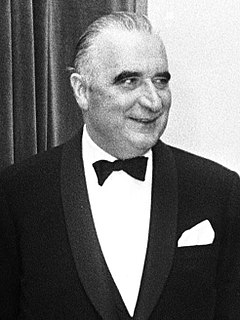
Georges Jean Raymond Pompidou was Prime Minister of France from 1962 to 1968—the longest tenure in the position's history—and later President of the French Republic from 1969 until his death in 1974. He had long been a top aide to president Charles de Gaulle. As president, he was a moderate conservative who repaired France's relationship with the United States and maintained positive relations with the newly independent former colonies in Africa.
Many legal scholars and politicians disagreed with this application of Article 11, which they felt was unconstitutional, while Gaullists generally supported the move. [5] François Mitterrand, former minister and future President of the Republic, characterized the referendum as unconstitutional. [7] Gaston Monnerville, president of the Senate, referred the matter to the Constitutional Council (Article 61). The council however ruled that it fell outside of its jurisdiction to strike down a reform voted by the French people, thus upholding de Gaulle's action. [5] [8] This was unsurprising: from 1958 to 1970, under Charles de Gaulle's presidency, the Constitutional Council was sometimes described as a "cannon aimed at Parliament", [5] protecting the executive branch against encroachment by Parliament; all referrals except the one from Monnerville had come from the Prime Minister, who always got a ruling of partial unconstitutionality (the Council had struck down for unconstitutionality provisions introduced by Parliament that the Prime Minister disagreed with). [5] Monnerville went as far as to use the strong word of forfaiture ("abuse of authority") against the behaviour of Prime Minister Pompidou, who had accepted the referendum project. [6] [9]
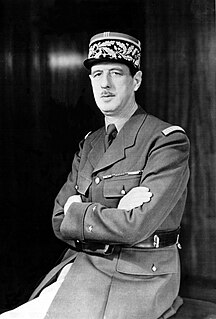
Gaullism is a French political stance based on the thought and action of World War II French Resistance leader General Charles de Gaulle, who would become the founding President of the Fifth French Republic.
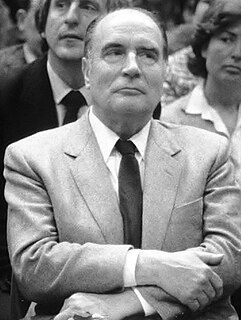
François Maurice Adrien Marie Mitterrand was a French statesman who served as President of France from 1981 to 1995, the longest time in office in French history. As First Secretary of the Socialist Party, he was the first left-wing politician to be elected President of France under the Fifth Republic.

Gaston Monnerville was a French politician and lawyer.
Many members of the National Assembly were also very unhappy about the situation. On 4 October 1962, the Assembly voted no-confidence in the Government, [10] resulting in the automatic resignation of the Prime Minister (Constitution, article 49-2); this was the only successful vote of no-confidence of the Fifth Republic. [11] The vote was supported by, among others, former prime ministers [12] Paul Reynaud and Guy Mollet, who severely criticized the referendum. [13] Charles de Gaulle dissolved the Assembly within a few days, [14] thus provoking legislative elections in November, and appointed Georges Pompidou again.
This page is based on this
Wikipedia article Text is available under the
CC BY-SA 4.0 license; additional terms may apply.
Images, videos and audio are available under their respective licenses.















